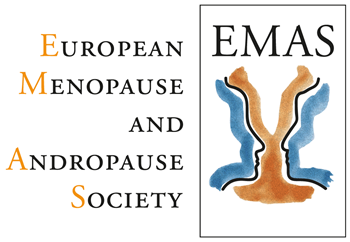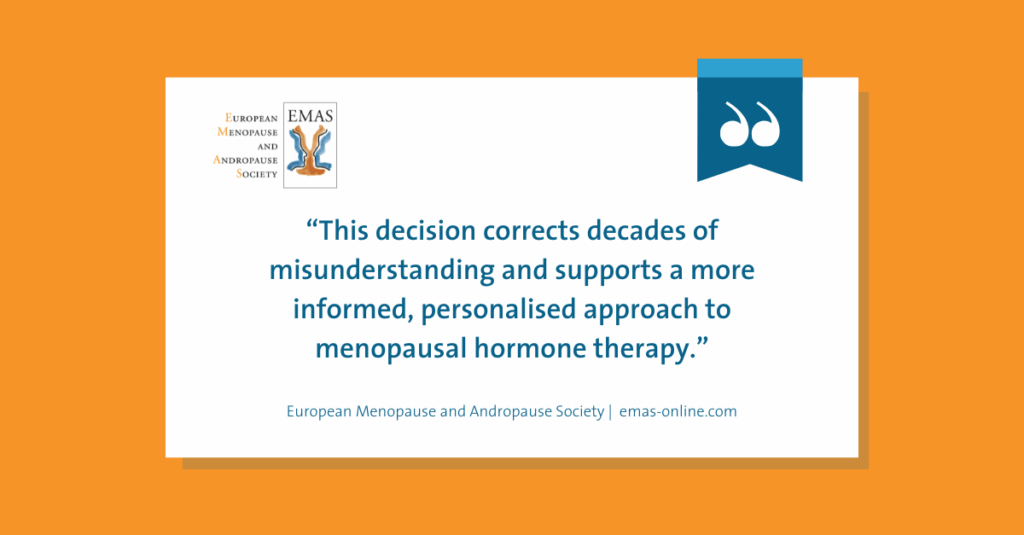Switzerland, 17.11.2025
The European Menopause and Andropause Society (EMAS) welcomes the recent decision by the U.S. Food and Drug Administration (FDA) to remove the long-standing “Black Box” warnings* from all estrogen-containing menopausal hormone therapy (MHT) products, including vaginal estrogens.
This decision reflects the now well-established scientific consensus that the original interpretation of the Women’s Health Initiative (WHI) was overly broad and, in several key aspects, misleading. For more than 20 years, these warnings have fuelled unwarranted fear, contributing to a substantial underuse of MHT among women who could have benefited from treatment.
Updated evidence: A more accurate perspective on MHT
A large body of high-quality evidence — including long-term WHI follow-up and newer observational and randomised data — shows that:
- For healthy women under 60 or within 10 years of menopause using appropriately selected systemic MHT, the benefits generally outweigh its risks.
- MHT is the most effective treatment for vasomotor symptoms, improves sleep and mood, and prevents osteoporosis and fractures.
- Benefits also extend to cardiometabolic health when therapy is tailored and appropriately timed.
These findings are fully aligned with current EMAS and other European menopause guidelines.
Beyond a warning label: A recognition of women’s health gaps
The FDA’s action is more than a regulatory correction — it is an acknowledgement of a structural gap in women’s health.
For decades, women’s biology has been underrepresented in research, and menopause has been insufficiently taught in medical curricula. The decision highlights the need for:
- sex-specific medical research,
- accurate and balanced communication,
- and greater investment in women’s health across the lifespan.
It marks an important shift towards gender-responsive medicine.
Avoiding a swing to the opposite extreme
While EMAS welcomes the FDA decision, it is essential to prevent a new form of misinformation.
The removal of a warning label does not imply that MHT is suitable for every woman or that it should be broadly prescribed without careful evaluation.
Key principles remain unchanged:
- MHT is highly effective for menopausal symptom relief, including the genitourinary syndrome of menopause, osteoporosis prevention in women at appropriate risk, but not universally indicated.
- MHT is not indicated for the primary and secondary prevention of cardiovascular disease in asymptomatic women.
- MHT is not indicated for the prevention of cognitive decline and dementia, frailty, and “anti-ageing” therapy.
- Treatment must remain individualised, considering age, symptom severity, personal and family risk profile, comorbidities, and patient preference.
- A blanket, one-size-fits-all approach is incompatible with modern, evidence-based menopause care.
- The goal is appropriate prescribing, not maximal prescribing.
A European call to action
The FDA decision provides an opportunity for Europe to reaffirm its commitment to advancing women’s health. Menopause is a pivotal life stage with far-reaching implications for healthy ageing and public health.
EMAS will continue to:
- support access to high-quality menopause care,
- advocate for robust sex-specific research and clinical education,
- and ensure that women across Europe have access to balanced, evidence-based information.
Conclusion
The removal of the U.S. “Black Box” warnings represents a significant scientific and symbolic milestone. It underscores the importance of accurate communication, sex-specific evidence, and respect for women’s individual health needs.
At the same time, EMAS stresses that progress in women’s health must not replace one extreme with another. High-quality menopausal care must remain personalised, balanced, and rooted in evidence.
EMAS remains committed to promoting nuanced, science-based, and compassionate menopause care — ensuring that every woman receives the right treatment, at the right time, for the right reasons.
* A “Black Box Warning” is the strongest safety warning applied by the U.S. Food and Drug Administration (FDA). It highlights potentially serious or life-threatening risks and is displayed prominently in a black-framed box on the product label. For menopausal hormone therapy (MHT), the Black Box Warning added in 2003 listed increased risks of breast cancer, stroke, venous thromboembolism, myocardial infarction, and dementia.
Relive the 30-minute EMAS roundtable!
With Petra Stute, Angela DeRosa, Elena Armeni and Dorenda van Dijken

